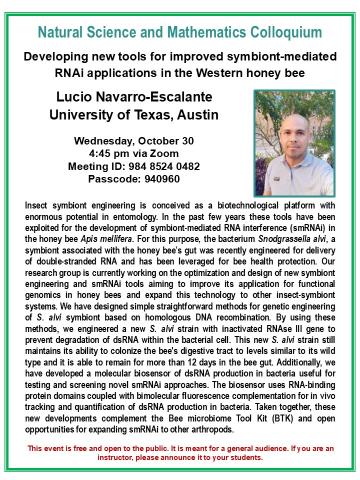-
Oct. 30, 2024
4:45 p.m. - 6 p.m.
+ Google CalendarVirtual via ZOOMIntended AudienceFacultyStaffStudentsAlumniGeneral public

Natural Science and Mathematics Colloquium
Developing new tools for improved symbiont-mediated RNAi applications in the Western honey bee
Lucio Navarro-Escalante
University of Texas, Austin
Wednesday, Oct. 30, 2024
4:45 p.m. via ZoomMeeting ID: 984 8524 0482
Passcode: 940960Insect symbiont engineering is conceived as a biotechnological platform with enormous potential in entomology. In the past few years these tools have been exploited for the development of symbiont-mediated RNA interference (smRNAi) in the honey bee Apis mellifera. For this purpose, the bacterium Snodgrassella alvi, a symbiont associated with the honey bee’s gut was recently engineered for delivery of double-stranded RNA and has been leveraged for bee health protection. Our research group is currently working on the optimization and design of new symbiont engineering and smRNAi tools aiming to improve its application for functional genomics in honey bees and expand this technology to other insect-symbiont systems. We have designed simple straightforward methods for genetic engineering of S. alvi symbiont based on homologous DNA recombination. By using these methods, we engineered a new S. alvi strain with inactivated RNAse III gene to prevent degradation of dsRNA within the bacterial cell. This new S. alvi strain still maintains its ability to colonize the bee's digestive tract to levels similar to its wild type and it is able to remain for more than 12 days in the bee gut. Additionally, we have developed a molecular biosensor of dsRNA production in bacteria useful for testing and screening novel smRNAi approaches. The biosensor uses RNA-binding protein domains coupled with bimolecular fluorescence complementation for in vivo tracking and quantification of dsRNA production in bacteria. Taken together, these new developments complement the Bee microbiome Tool Kit (BTK) and open opportunities for expanding smRNAi
This event is free and open to the public. It is meant for a general audience. If you are an instructor, please announce it to your students.
Lecture
